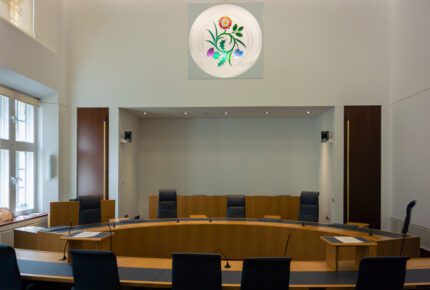

Anti-money laundering legislation gives the police and other law enforcement organisations substantial powers over financial organisations to tackle financial crime. This includes enabling the police to instruct your bank to freeze your account where they receive a suspicious activity report. The period of time that your bank is allowed to freeze your account for without providing an explanation is known as the moratorium period. The police can apply to the court to extend the moratorium period in order to give themselves more time to investigate. This article explains the law behind suspicious activity reports, moratorium periods and account freezing orders. If you find yourself in the unenviable position of having your account frozen, read on to understand the police’s powers to prevent you from accessing your own money. Remember, there is no substitute for advice from your own criminal defence solicitor.
What is a SAR (Suspicious Activity Report)?
A suspicious activity report (SAR) alerts law enforcement to potential criminal activity such as money laundering and terrorist financing. The UK Financial Intelligence Unit at the National Crime Agency is responsible for receiving and storing SARs. It receives more than 460,000 each year and has over two million stored on its database. These are used to tackle a wide variety of different types of organised and financial crime.
Financial institutions such as banks can make a SAR and are under a legal obligation to do so where they suspect that money laundering is taking place. In addition other organisations that deal with client money are also under a legal obligation to report suspicious activity. This is established by Part 7 of the Proceeds of Crime Act 2002 (POCA) and the Terrorism Act 2000. This includes solicitors, accountants, and estate agents. Other individuals may also have a legal obligation to report in certain circumstances. Anyone who has a suspicion or knowledge of money laundering or terrorist financing can submit a SAR. POCA creates an offence of ‘tipping off’ that makes it unlawful for the person who has submitted the SAR to notify the person under suspicion that they are doing so.
SARs do not only apply to drug dealers and terrorists, they can also relate to tracing sex offenders, murder suspects, those involved in online child pornography, and the perpetrators of human trafficking. According to the National Crime Agency, a SAR is likely to contain information such as contact details, alias identities, investment activity, and the management of other assets in a manner that raises suspicion that criminal activity is being committed.
SARs containing sensitive information relevant to national security are retained by the NCA, whereas the others are shared with local police forces via a secure channel. Once the police or other law enforcement agencies such as the National Crime Agency receive a SAR, they will launch an investigation into the suspicious activity alleged or use it to enhance existing investigations. For example, if the NCA is investigating boiler room frauds, a SAR may provide up to date information in respect of how criminal gangs are operating in relation to these types of offences. Compiling information received from SARs can assist law enforcement to build a picture of offending patterns, or the vulnerability of a particular sector to money laundering.
What can I do if my bank account has been frozen?
There are various different reasons why your bank account could be frozen. Some may relate to the fraud prevention services at your bank which are designed to protect you from being defrauded. If this is the case, then reinstating your bank account should be fairly straightforward. You would just call your bank and explain that no fraudulent activity has taken place. You will probably have to answer some security questions and confirm that you authorized certain transactions. At this point, your account will normally be unfrozen.
However, in some circumstances your bank may freeze your bank account due to suspected criminal activity. This can happen where your bank submits a SAR to the National Crime Agency who may then launch an investigation against you. If this takes place, you would be advised to instruct a criminal defence solicitor, as you are likely to be under suspicion of serious criminal activity. Your solicitor can correspond with the National Crime Agency, or other law enforcement organisation which is investigating your case.
Agencies investigating serious or organised crime, including money laundering, often operate under the veil of secrecy, therefore you may find that very little or no information is provided to you until the investigation is completed and law enforcement have either decided to take no further action against you (in which case you may never really find out what the case was about), or you are placed under arrest (at which point the police are obliged to explain to you what you have been arrested for).
How long is a bank allowed to freeze your account?
Once a SAR has been submitted, the NCA will have 7 days to respond. In the meantime, your account will be frozen. This is known as the moratorium period. After 7 days have passed, the NCA can either instruct the bank to unfreeze your account, or they can extend the time that the account is frozen for an additional 31 days (42 days in total). During this time, your bank will not be permitted to provide you with any information in respect of the investigation. You may be totally in the dark as to why you are unable to access your own money! The bank manager is not even allowed to tell you that your account has been frozen, or why. If someone working at the bank did disclose this information, they could face up to five years in prison for a ‘tipping off’ offence pursuant to Section 333 of the Proceeds of Crime Act 2002.
Under Section 336A of the Proceeds of Crime Act 2002, the Crown Court can extend the moratorium period for additional periods of 31 days incrementally, up to a total of 6 months. The court will only agree to extend the moratorium period where:
- There is an ongoing investigation following a SAR which has not been completed
- It is satisfied that the investigation is being conducted diligently and expeditiously
- Further time is required to conduct the investigation
- It is reasonable to extend the moratorium period
The police are obliged to make this application prior to the expiry of the existing moratorium period. You will be aware of this application, as the court papers should be served upon you.
Once the NCA has investigated and found a reasonable suspicion that your account is being used for criminal purposes, it can apply to the Magistrates’ Court for an account freezing order. The court will consider whether there are reasonable grounds to believe that the cash within the account is the proceeds of crime or is intended to be used for criminal purposes. The one advantage to the investigation reaching this stage is that you should now be provided with some more information about the police’s suspicions of your criminal activity.
What happens when your bank account is blocked?
If an account freezing order is granted, this will enable the account to be frozen for up to two years while an investigation is taking place. However, usually the freezing order will be initially for a shorter period such as 3 months. The order can subsequently be varied or discharged by the court. The order that is served upon you will be accompanied by an explanation of the investigation that is taking place.
Whilst the freezing order is in place, you will not be able to access the fund in your account and money cannot be withdrawn or transferred. This can prove highly inconvenient and financially disastrous to many people.
Often the National Crime Agency will begin the investigation by acting on initial intelligence. Then once an account freezing order is granted, they will hand the investigation over to your local police force to conduct the next steps.
After the freezing order has expired, the police can then apply to the court for the money to be forfeited if they can prove that it is the proceeds of crime or intended for use in criminal activity.
Where to get further help?
Account freezing orders can be both invasive and stressful to you and the dependents in your family who are relying upon you. At Stuart Miller Solicitors, we understand the huge impact that money laundering investigations can have upon suspects. Our criminal defence team will take a proactive approach to defending individuals suspected of involvement with the proceeds of crime. We will hold the police accountable and ensure that the pressure is upon them to make expeditious decisions to end the prolonged uncertainty that account freezing orders can cause. Contact us for a no obligation consultation today.
OUR COMMITMENTS TO YOU:
-
Responsive
A legal expert will consult you within 24 hours of making an enquiry.
-
Empathetic
We will always treat you with trust, understanding and respect.
-
Specialised
Your case will be handled by an expert who specialises in your type of offence.
-
Proactive
We will take early action to end proceedings as soon as it is practically and legally possible to do so.
-
Engaged
You will be kept updated on your case at all times. We will provide a named contact available to answer your questions.
-
Caring
We understand this is a difficult and stressful time for you and your family. Our team will support you every step of the way.
-
Tenacious
We will never give up on your case. We fight tirelessly to get you the best possible outcome.

